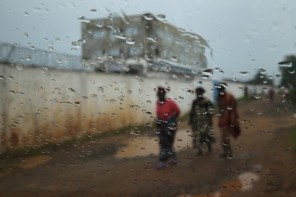Much ado about pictures lately. Not long after I asked last week whether portraits of Rwandan survivors that got a nod from the NYT really told us much, the Lens Blog followed up with portraits of Holocaust survivors. Here’s what duckrabbit had to say (thanks, Scarlettlion):
Do the photos really tell us anything about the ‘individuality’ of those sitting ? To me they represent a homogenisation of grief. ‘Individuality’ withers under the weight of a brutal aesthetic and style, and that above all else is where the photographers explanation seems a little misguided. Its an easy trap to fall into by someone has indeed looked into their eyes, whilst we are left to peer into our screens.
Meanwhile, what photographs do or don’t tell us — by the photographer’s design — is the topic at hand in this weekend’s NYT magazine. Roman Vishniac is famous for his pre-war photographs of Eastern European Jewish life, in which Jews all live on shtetls, poor and pious.
Except not, exactly. Maya Benton, a curator, recently found a trove of Vishniac’s work that presents a decidedly different image — and that he left out of his public exhibitions. All that poverty-ridden piety? Turns out to have been a commission from the Joint Distribution Committee, which asked for exactly that level of poverty to help fundraise. As Benton puts it,
“’The picture of the world I had recreated in my mind — the world my whole family came from — was actually from a commission to document only the poor and the Orthodox….'”
The article continues:
The most extensive falsification, however, is in the captions, the bulk of which Vishniac wrote after the war. Many include incredibly vivid details — too vivid — as well as dramatic narratives that either could not have happened or could not have happened the way Vishniac presented them. Even the selection of what Vishniac chose to publish now seems, broadly, like a distortion. ‘It’s as if we took pictures of homeless people in New York and then the city fell into the sea, and 50 years from now people looked at those photos and thought, That’s what New York was,’ Benton says.”
Portraiture has power. Usually, we think that power lies with the individual subject, with how powerful the image of one person is. But sometimes, the power of photography is all about the photographer.


“But sometimes, the power of photography is all about the photographer.”
Recently, there’s been a lot of buzz about a photographer booted from a competition due to over-manipulating an image. Photojournalistic ethics in the age of Photoshop are constantly questioned (and rightly so- there needs to be accountability).
But, beyond blatantly cloning out pieces of an image, the photographer has immense control over an image before he or she ever releases the shutter. Framing, lighting, what you bring in to the frame, what you leave out- these are all decisions that influence the final image.
Every image is subjective, and that means the photographer has tremendous power over what is presented as fact to the world… a frightening and sobering call for responsible reporting, even while acknowledging that you’re skewing the story whether you want to or not.
Thanks for this piece, Jina.
Hmmm… rang some bells here. I’m only just “getting into” photography in Rwanda. Not sure I’d feel confident enough to do portraits. I’d argue that the Lens blog link to the Rwanda genocide survivors photos is still good. However, the photos – as they are presented – are very one dimensional. Not to say there won’t be more of “a story” in book form?
Did you read this:
http://www.adevelopingstory.org/2010/how-to-take-photos-of-africa-or-where-intent-and-ideas-collide
And, yes, I got your email. Want to meet up, but terribly pushed for deadlines and family stuff at the mo. Will call demain or tonight.
Tremendously well said, GKB!
Graham, love that link. Sounds like you’re giving the photog a pass and blaming the Lens blog? Will be curious to see some photog-controlled results…
I’m also beating back a deadline, no worries…